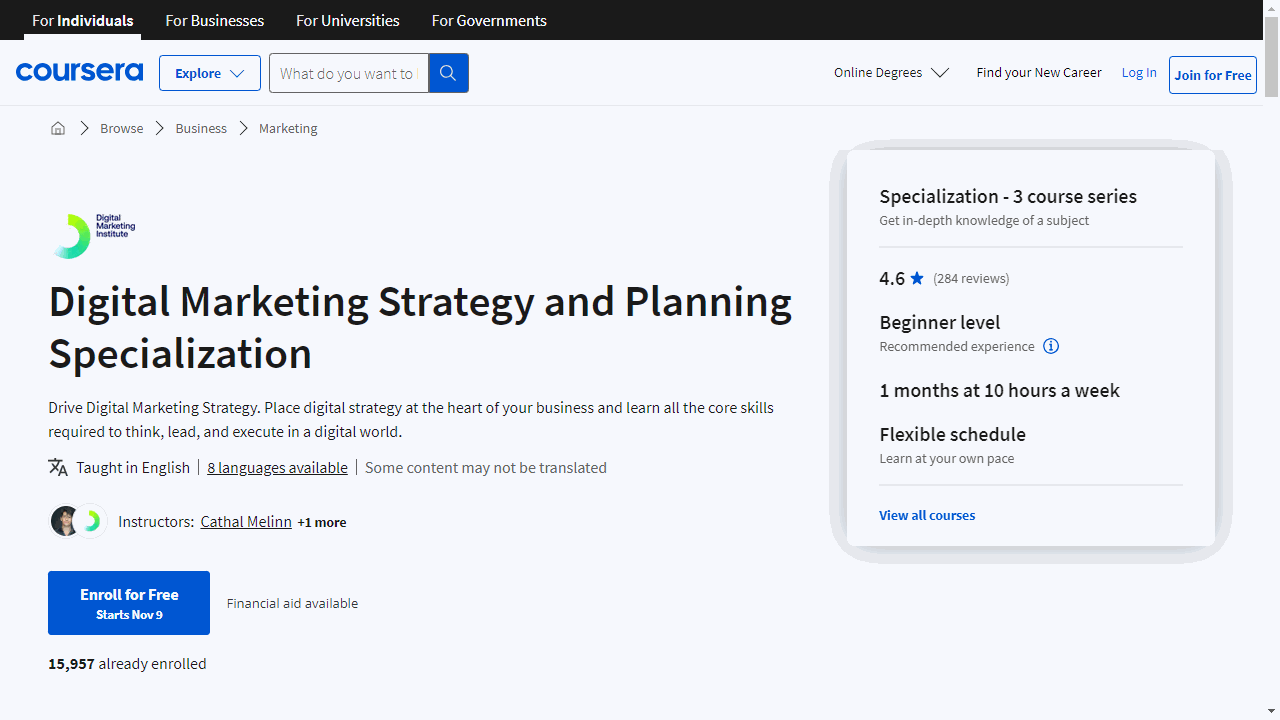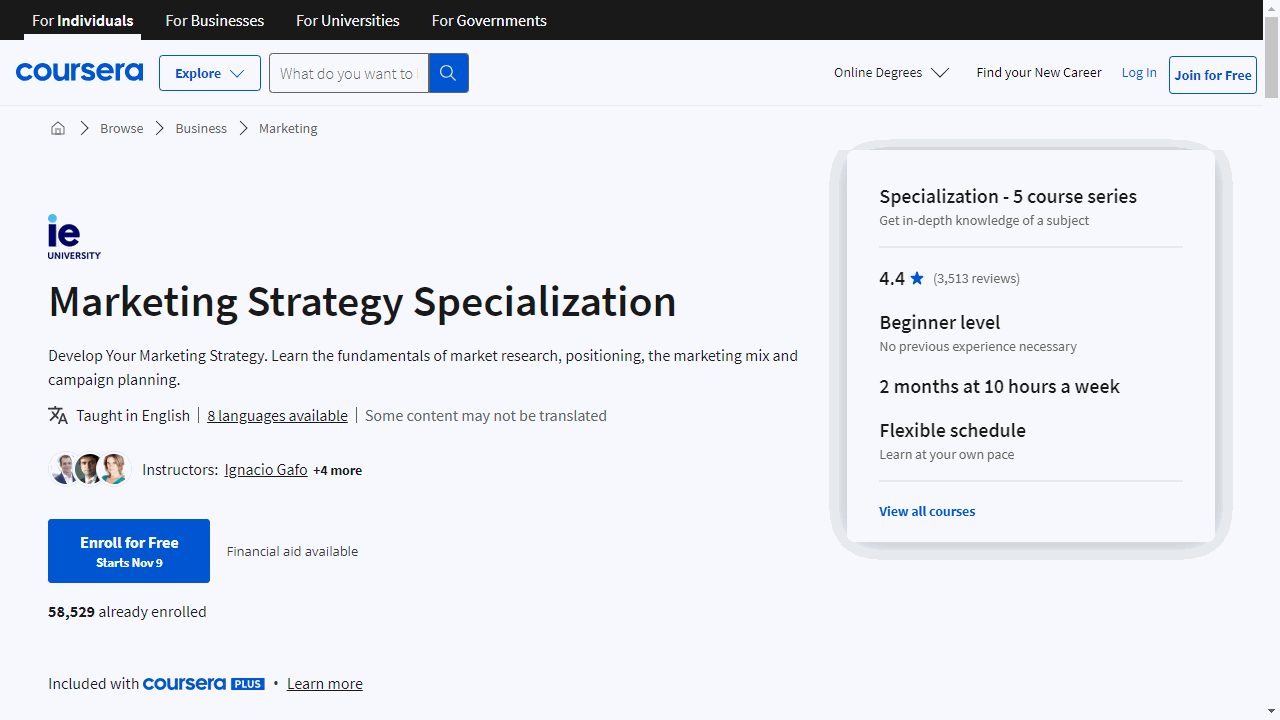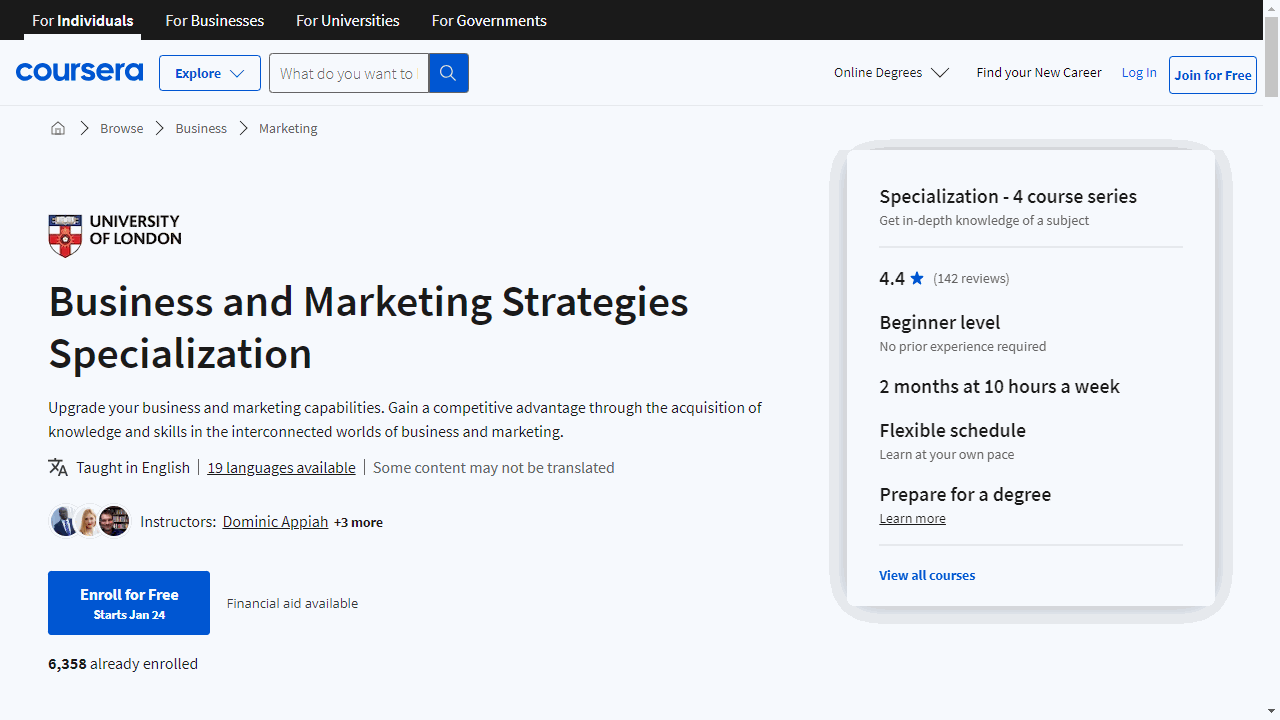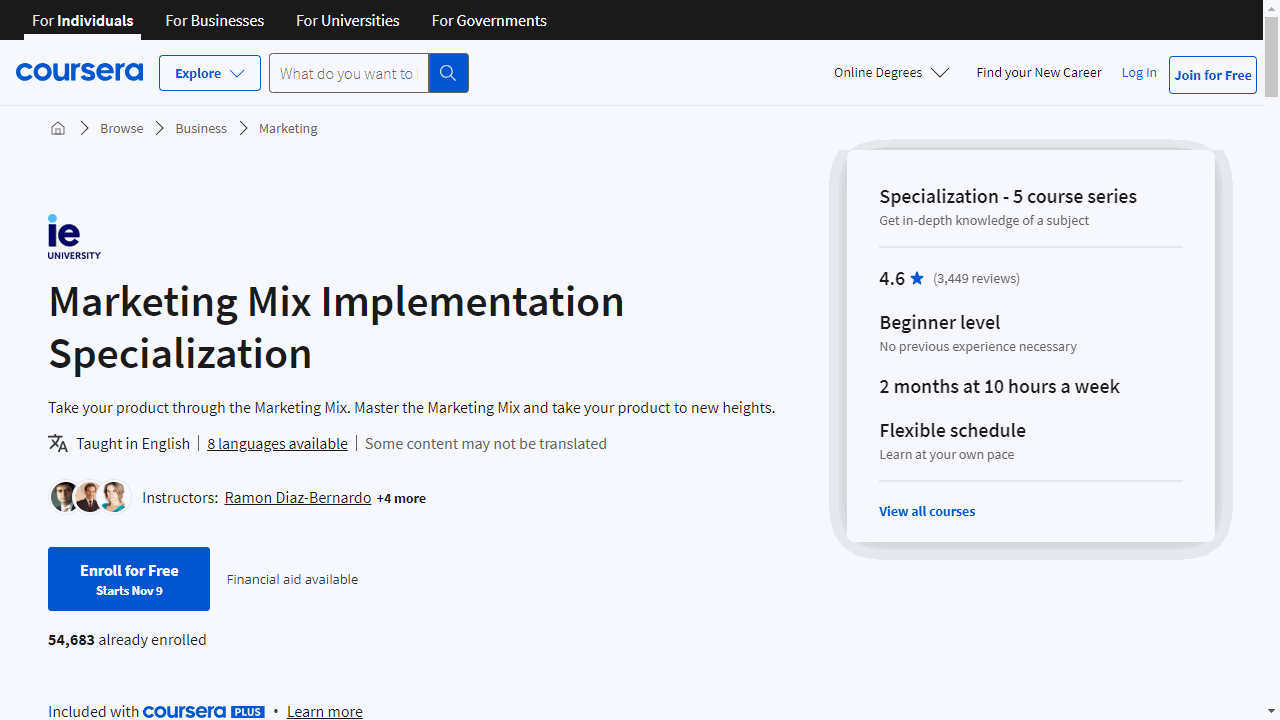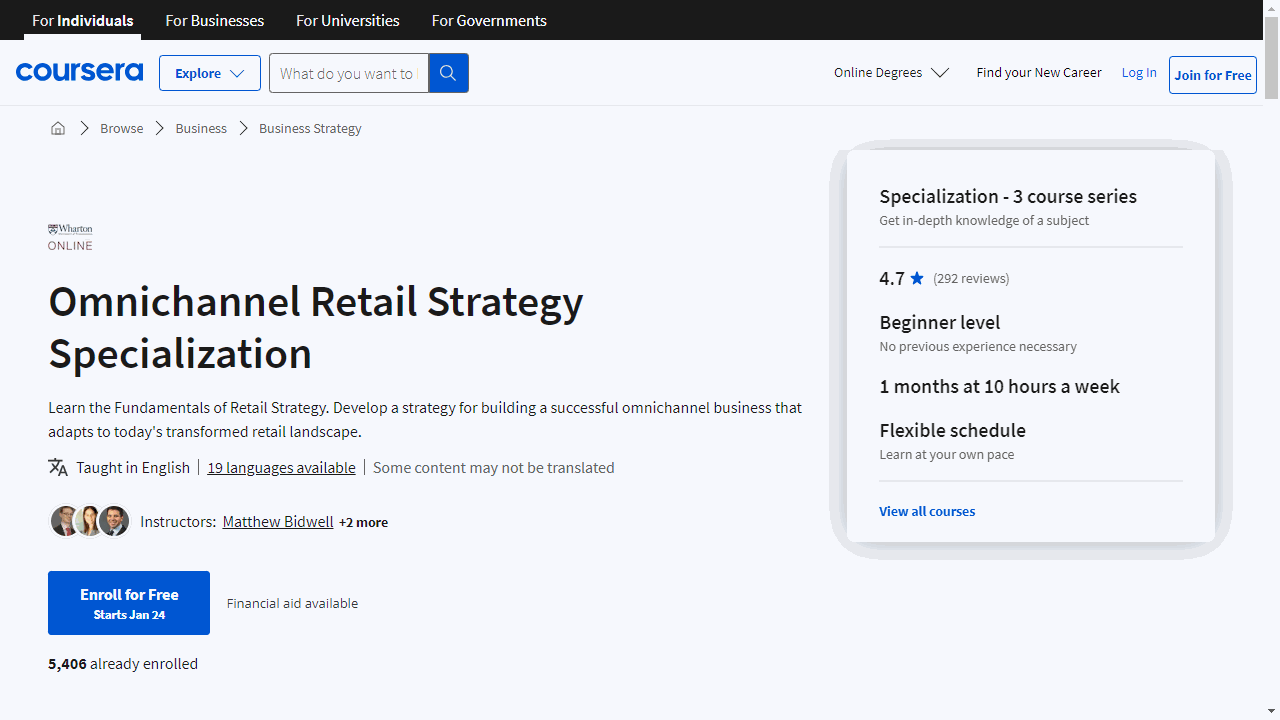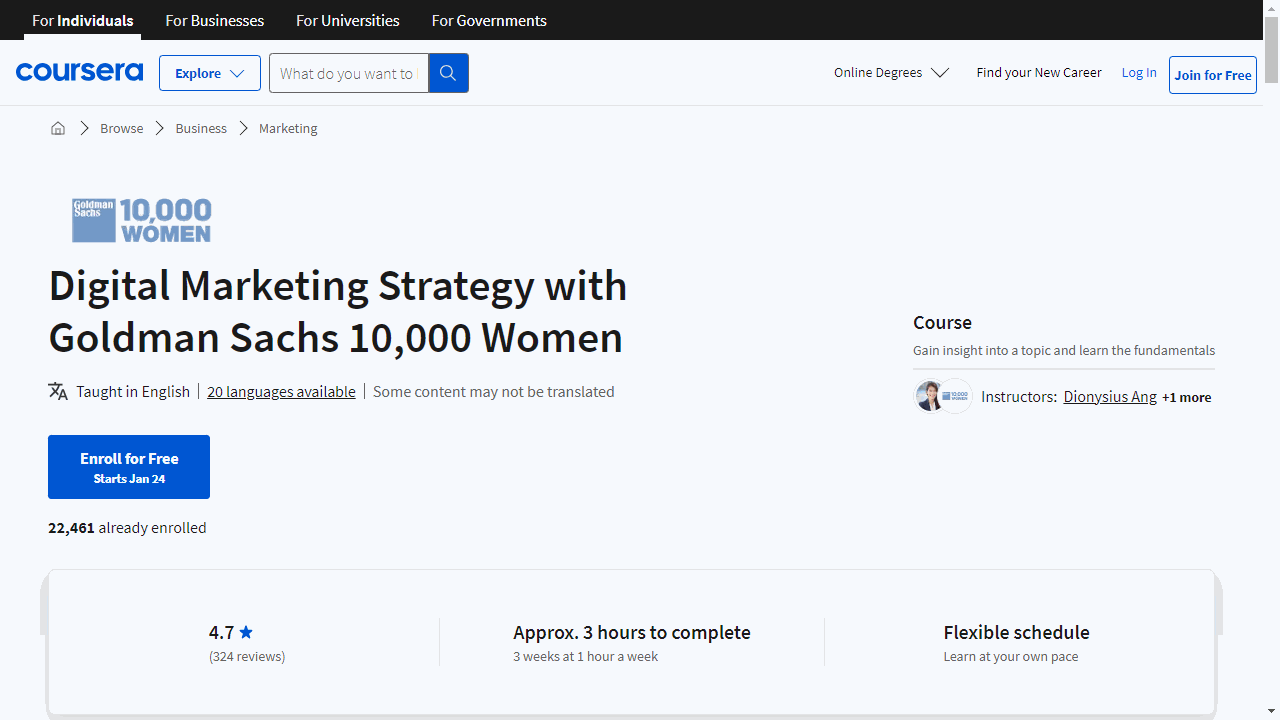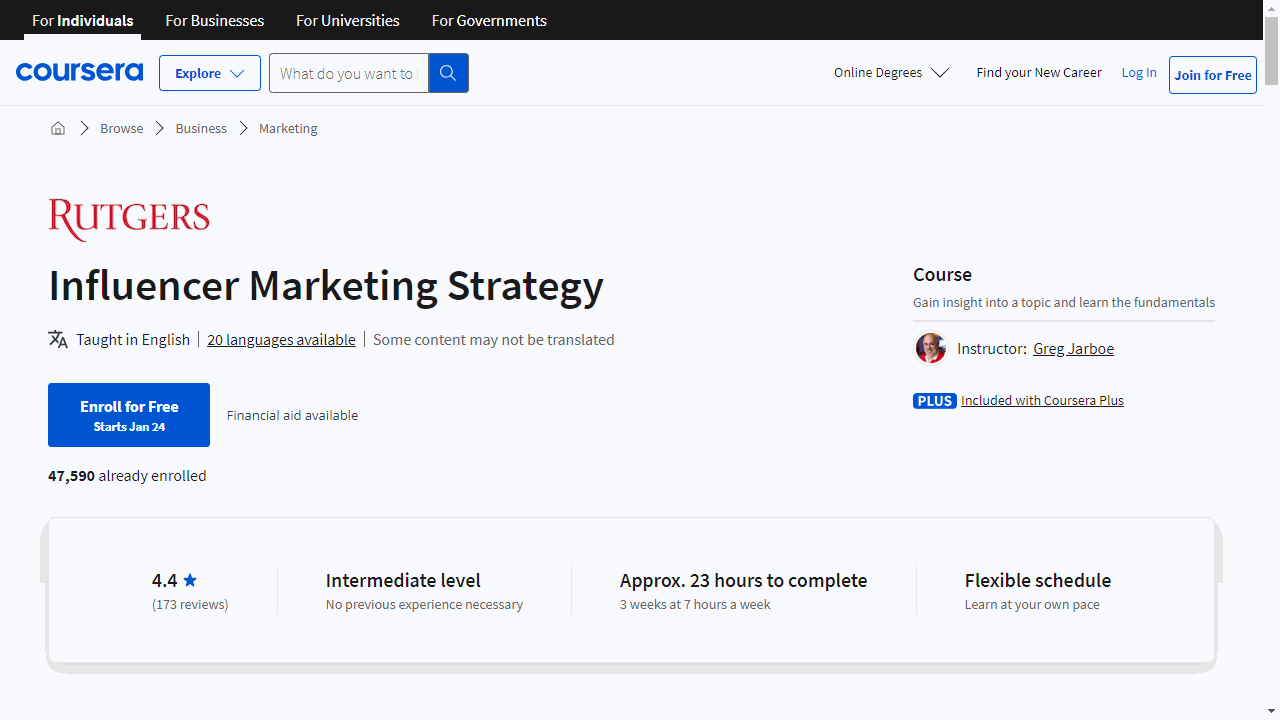Marketing strategy is the backbone of any successful business, outlining how to reach target customers, promote products or services, and achieve desired business objectives.
Mastering marketing strategy equips you with the skills to navigate competitive landscapes, identify market opportunities, and drive sustainable growth.
Whether you’re a seasoned marketer looking to refine your approach or a newbie just starting your journey, a strong foundation in marketing strategy can make all the difference.
Finding the right course on Coursera can be a challenge, with so many options available.
You’re searching for a program that’s comprehensive, engaging, and taught by experts, but also aligns with your learning style and career goals.
We recommend the Digital Marketing Strategy and Planning Specialization as the best course overall.
This specialization goes beyond theory, offering practical insights into audience and competitor analysis, crafting compelling content, and developing a seamless omnichannel marketing strategy.
It culminates with the “Digital Leadership and Digital Strategy Execution” course, equipping you to lead digital teams and make the leap from marketer to visionary leader.
You’ll gain a Certified Digital Marketing Associate certification from the Digital Marketing Institute, along with a three-month Power Membership, offering additional resources to advance your career.
While this specialization stands out, Coursera offers a variety of other excellent marketing strategy courses.
Keep reading to discover more options tailored to your specific needs and interests, from mastering the art of digital marketing to delving into the fundamentals of marketing research and consumer behavior.
Digital Marketing Strategy and Planning Specialization
It all starts from “Digital Strategy and Business Opportunity.”
Here, you’ll explore how digital and social media have reshaped consumer behavior.
The course goes beyond theory, offering practical insights into audience and competitor analysis through digital research.
You’ll also learn to craft compelling content that resonates with your target audience, a crucial skill in the content-driven world of digital marketing.
Next, “Digital Channel Planning and E-Commerce Strategy” delves into the complexities of modern consumer behavior, where the lines between online and offline shopping blur.
You’ll discover how to create a seamless omnichannel marketing strategy that engages customers at every touchpoint.
The course also covers the essentials of e-commerce, ensuring you can design strategies that not only attract but also retain customers in the competitive online marketplace.
The final course, “Digital Leadership and Digital Strategy Execution,” is about making the leap from marketer to visionary leader. It focuses on strategic thinking and the nuances of leading digital teams.
You’ll gain insights into customer experience design and learn how to safeguard your digital initiatives against potential risks.
Completing the specialization earns you a Certified Digital Marketing Associate certification from the Digital Marketing Institute, and a three-month Power Membership, offering additional resources to further your career.
Marketing Strategy Specialization
The specialization begins at “Market Research and Consumer Behavior,” where you’ll learn to transform real-world problems into research questions.
This course isn’t just about gathering data; it’s about understanding the psychology behind consumer choices and using that insight to inform your marketing strategies.
Moving on to “Positioning: What you need for a successful Marketing Strategy,” you’ll discover the art of making your product or service memorable.
Positioning is crucial, and this course gives you the tools to find your niche in the market and attract the right customers.
In “Marketing Mix Fundamentals,” you’ll delve into the four P’s—Product, Pricing, Place, and Promotion.
This course breaks down each component, teaching you how to manage your brand, set competitive prices, choose the right distribution channels, and craft compelling promotional messages.
“The Marketing Plan” is where theory meets action.
You’ll create a marketing plan from scratch, applying the concepts you’ve learned to either your own product idea or a case study.
This hands-on approach ensures that by the end of the course, you’ll have a tangible plan to guide your marketing efforts.
Finally, the “Marketing Strategy Capstone Project” challenges you to apply your accumulated knowledge to a real-life business scenario.
This capstone is a culmination of your learning, testing your ability to craft a comprehensive marketing strategy.
Throughout these courses, you’ll build a robust set of skills, including market segmentation and analysis, which are essential for any marketing professional.
The specialization also fosters a collaborative learning environment, encouraging you to engage with peers from around the globe.
Business and Marketing Strategies Specialization
Provider: University of London
This set of courses equips you with the practical know-how and strategic insight needed to excel in today’s business landscape.
Dive into “Fundamentals of Marketing Strategy” to master the art of crafting impactful marketing plans.
You’ll interact with peers, dissect marketing models, and apply concepts to real-world scenarios.
By the end of this course, you’ll be adept at analyzing marketing environments and creating strategies that deliver results.
If global business intrigues you, “Fundamentals of International Business” is your gateway to understanding the complexities of cross-border commerce.
You’ll explore globalization, internationalization, and the role of multinationals, connecting theory with current business practices.
“Operations Systems Excellence” is where you learn to streamline operations for peak performance.
This course reveals how effective operations management can propel a company to success, focusing on the creation and delivery of products and services.
Lastly, “Consumption, Marketing and Culture” challenges you to think beyond the transaction.
It examines the influence of marketing on consumer culture and prompts you to consider the broader implications of being a consumer in today’s society.
Each course in this specialization is a stepping stone to becoming more proficient in business and marketing strategies.
With a focus on practical application and strategic thinking, you’ll emerge well-prepared to navigate and succeed in the competitive business world.
Marketing Mix Implementation Specialization
This suite of courses is designed to equip you with a comprehensive understanding of the marketing mix, from brand management to pricing strategies.
The “Brand and Product Management” course is a deep dive into the strategic side of branding.
You’ll explore concepts like product lifecycle and brand equity, learning how to craft a brand strategy that delivers both immediate wins and sustainable growth.
Under the guidance of Luis Rodriguez Baptista, a seasoned marketing consultant from IE Business School, you’ll gain insights into making your brand resonate with consumers and employees alike.
“Pricing Strategy” tackles the complex world of pricing, a critical component of the marketing mix that directly impacts profitability.
This course demystifies the psychology of pricing and teaches you how to determine the optimal price point for your products.
Martin Boehm, with over a decade of experience, leads you through practical applications that will enable you to contribute effectively to your company’s pricing strategy.
In “Channel Management and Retailing,” you’ll learn how to navigate the evolving landscape of distribution.
The course covers everything from crafting a long-term distribution strategy to understanding the competitive advantages of different retailing approaches.
With real-world examples and expert interviews, you’ll be prepared to enhance your company’s performance through effective channel management.
“Integrated Marketing Communications” is all about the power of a well-executed marketing campaign.
This course covers the essentials of advertising, public relations, and digital marketing, providing you with the tools to create cohesive and impactful marketing communications.
Eda Sayin, along with industry professionals, offers practical knowledge that will help you make informed decisions about advertising and digital marketing strategies.
The capstone project is where theory meets practice. After completing the preceding courses, you’ll apply your newfound skills to a real-world scenario: the launch of Tesla’s Model X.
This hands-on experience is invaluable, allowing you to demonstrate your ability to navigate the marketing mix in a dynamic business environment.
You’ll emerge with a set of practical skills, from understanding how to manage a brand to effectively communicating with your target audience.
Omnichannel Retail Strategy Specialization
Provider: University of Pennsylvania
If you’re aiming to sharpen your retail business strategies with practical, forward-thinking skills, this specialization is your match.
Dive into “Retail Marketing Strategy” to understand how to pivot from focusing on products to prioritizing customers.
Professor Barbara Kahn will walk you through the “Kahn Retailing Success Matrix,” a framework that helps you craft strategies to keep your business competitive and responsive to future changes.
You’ll learn to anticipate and fulfill customer expectations, ensuring your brand stands out.
In “Managing Human Capital in Retail,” Professor Matthew Bidwell emphasizes the importance of your team.
You’ll gain insights into hiring, training, and retaining the right people, and discover how to inspire them to drive your business forward.
This course hones in on the critical role employees play in retail success, preparing you to enhance your company’s internal strength.
“Retail Digital Supply Chain” zeroes in on the intersection of traditional supply chain management and digital innovation.
You’ll revisit core supply chain concepts and explore how digital transformation is creating new opportunities.
By the end, you’ll grasp how analytics can add value to retail operations and what strategies are helping traditional retailers thrive in a digital world.
Each course is packed with actionable knowledge, focusing on the key entities of marketing strategy, human capital, and supply chain within the retail context.
Digital Marketing Strategy with Goldman Sachs 10,000 Women
Provider: Goldman Sachs
This course is designed to equip you with the skills to create and manage a successful digital marketing campaign.
You’ll start by learning how to develop a campaign that resonates with your target audience and aligns with your business objectives.
Understanding the ins and outs of owned media, like your website and social media channels, is next, giving you control over your brand’s online presence.
Then, you’ll delve into paid media strategies, discovering how to effectively use advertising to expand your reach.
You’ll also get the lowdown on promoting your content to ensure it gets the attention it deserves.
Viral marketing is another exciting area you’ll tackle.
You’ll learn how to craft content that’s so engaging, people can’t help but share it, amplifying your message far and wide.
Tracking the success of your campaign is crucial, and you’ll master tools for monitoring performance and using social listening to keep a pulse on your brand’s online reputation.
With hands-on exercises, you’ll put theory into practice, identifying your audience, measuring your campaign’s impact, and reflecting on your progress to refine your approach.
Influencer Marketing Strategy
Provider: Rutgers the State University of New Jersey
This is a comprehensive guide to harnessing the power of influencers to elevate your brand.
You’ll start by grasping the essentials: what influencer marketing is and its significant value.
The course doesn’t shy away from the tough stuff, like pinpointing the perfect influencers and navigating the challenges of engagement tactics.
Content creation is key, and you’ll learn to craft videos and posts that resonate with audiences, driving both smiles and sales.
Real-world case studies, such as GE’s innovative influencer collaborations, bring these lessons to life.
Tools like BuzzSumo and Traackr are your new best friends, helping you identify influencers and measure the impact of your campaigns.
You’ll delve into KPIs, including brand lift and engagement rates, and use TrueSocialMetrics for in-depth analysis.
Building lasting influencer relationships is crucial, and you’ll discover how to maintain an “always-on” program for ongoing success.
The course also equips you to engage with various influencer types, from celebrities to niche experts, with tailored tactics.
When it’s time to justify your influencer marketing spend, you’ll be ready.
The course teaches you to calculate ROMI and craft a compelling business case for your campaigns.
Your final project?
A pitch deck for your influencer strategy, showcasing your newfound expertise.
Frequently Asked Questions
What is Marketing Strategy and why is it important?
Marketing Strategy refers to a comprehensive plan that outlines an organization’s overall marketing efforts and goals.
It involves determining the optimal approach to reach target customers, promote products or services, and achieve desired business objectives.
Marketing Strategy is crucial because it provides a roadmap for effectively allocating resources, establishing a unique brand positioning, and maximizing the impact of marketing campaigns.
A well-crafted marketing strategy helps businesses navigate competitive landscapes, identify opportunities, and drive sustainable growth.
What are the different types of Marketing Strategy?
There are several types of marketing strategies that businesses can employ, depending on their goals and target audience.
Some common types include product marketing, which focuses on promoting specific offerings; brand marketing, which aims to build and reinforce a company’s image and reputation; inbound marketing, which attracts customers through valuable content; outbound marketing, which involves proactively reaching out to potential customers; and digital marketing, which leverages online channels and platforms to engage with consumers.
What skills do you need to be good at Marketing Strategy?
Developing and executing effective marketing strategies requires a diverse set of skills.
Strong analytical and research abilities are essential for gathering and interpreting market data, consumer insights, and competitive intelligence.
Exceptional communication and storytelling skills are necessary to craft compelling narratives and messaging.
Strategic thinking and problem-solving abilities are crucial for identifying opportunities, addressing challenges, and making informed decisions.
Additionally, creativity, adaptability, and a deep understanding of marketing principles and best practices are invaluable assets.
What common tools should Marketing Strategy beginners learn?
For beginners in marketing strategy, it’s beneficial to familiarize themselves with a variety of tools and platforms.
Customer relationship management (CRM) software, such as Salesforce or HubSpot, can help manage customer data and interactions.
Analytics tools like Google Analytics provide insights into website traffic and user behavior.
Social media management platforms like Hootsuite or Buffer can streamline social media marketing efforts.
Design tools like Canva or Adobe Creative Cloud can aid in creating visually appealing content.
Project management tools like Trello or Asana can help organize and collaborate on marketing campaigns.
What jobs can you get with Marketing Strategy skills?
Individuals with strong marketing strategy skills can pursue a wide range of career opportunities.
Some potential roles include marketing manager, marketing strategist, brand manager, product marketing manager, content marketing specialist, digital marketing manager, and social media manager.
Additionally, marketing strategy skills are valuable for positions in advertising agencies, public relations firms, market research companies, and consulting firms.
What should I look for in a Marketing Strategy course for beginners?
When choosing a marketing strategy course for beginners, it’s essential to look for a comprehensive curriculum that covers the fundamentals of marketing principles, consumer behavior, market research, strategic planning, and marketing mix elements (product, price, place, and promotion).
The course should provide practical examples, case studies, and hands-on projects to reinforce theoretical concepts.
Additionally, it’s beneficial if the course covers relevant tools and platforms used in the industry, as well as emerging trends and best practices in digital marketing.
What are the common uses of Marketing Strategy across various industries?
Marketing strategy plays a vital role across various industries, as businesses strive to effectively promote their products or services, engage with customers, and achieve sustainable growth.
In the consumer goods industry, marketing strategies focus on building brand awareness, positioning products, and driving sales through targeted campaigns.
In the technology sector, marketing strategies often emphasize product launches, thought leadership, and leveraging digital channels.
In the healthcare industry, marketing strategies aim to educate patients, promote wellness initiatives, and build trust in healthcare providers.
Across all industries, marketing strategies are essential for understanding customer needs, differentiating offerings, and ultimately driving business success.
